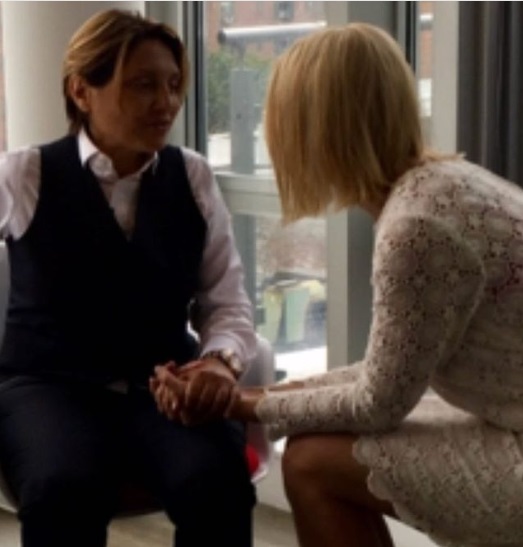When a loved one dies, we’re leveled.
Grief can break and bewilder us. If we don’t tend to our losses, it has the power to knife its way into our core and destroy us.
One of the most mystifying parts of loss is the utter “goneness” of the person who’s died. Whether a death is expected or sudden, we feel the sheer absence of that person everywhere, unformed, yet hulking.
“Where the hell are you?” I whispered to my brother after he died unexpectedly. I’d sit on my parents’ porch in the inky darkness, chain-smoking, staring at the space between the branches.
I knew where his body was, but what about the rest of him? The part of him that strummed out punk rock versions of “Leaving on a Jet Plane”? That always managed to pick me out the perfect gift? I sat and waited for some sort of sign from him that would help redefine our new relationship, which was so suddenly and strangely one-sided.
But I heard nothing. No ravens swooping in, no sudden gusts of wind, no flickering lamp lights.
His absence was so stark and heavy.
Author Elizabeth Gilbert’s partner, Rayya Elias, died in early 2018 of pancreatic cancer. Gilbert has written openly and vulnerably about her loss, and earlier this week she shared how she stays connected to Elias by sharing a screenshot of her voicemails to Rayya on Facebook:
“This is a practice I started last spring, because I missed talking to her so much that it was killing me. I needed to talk to her. Then I discovered that the act of leaving her a “message” on my phone makes me feel like I’m in communication with her. Something about the fact that the message is being recorded makes me feel like it’s being received. So I get to talk to her, laugh with her, cry with her. Talking to her in this way brings her near to me.
I have other practices too, that help bring Rayya near. Every morning for the last few months, for example, I have danced. I say to Rayya: “You pick the song,” then I hit shuffle, and I dance to whatever music she chooses. Sometimes it’s AC/DC, sometimes it’s Mozart. It’s always perfect. This is how I get to dance with her, and dance out my grief.
I also write to her. When I need her irreplaceable advice, I open my laptop and type the words: “I need you Rayya,” then I allow my fingers to type her responses. She’s always right there to help me—just as wise and funny as ever.”
Jamie Anderson wrote, “Grief is just love with no place to go.”
To give my love somewhere to go in those early months of loss, I wrote my brother letters. I’d capture surfacing memories, made lists of all the things I missed about him, and occasionally even raged at him. When I wrote letters to him, or listened to music he loved, I could feel that cord of connection hum between us.
I felt, in those moments, like I was still a sister.
Grief asks us to reconcile the impossible: that we must find a way to live without someone we can’t imagine living without. It asks us to cross the bridge from our life with their physical presence to our life without their physical presence.
Grief is messy and non-linear. We step forward. We step back, back, back. We wonder if we’re losing our minds. We whisper to our dead, we search for them in the faces of strangers, we dream them back to life and wail when we wake up.
It’s not pretty or quick or comfortable. It stretches the muscles of our hearts so far that we sometimes think that we’ll die from the pain too.
Gilbert says:
“Never have I needed my creativity more, than as I navigate this devastating loss. I refuse to passively wait for signs, visions, or healing. I am unembarrassed to create my own healing. I will demand from Rayya, and from Spirit, whatever my heart needs. I cannot live without Rayya, so I don’t: I draw her near.
For anyone who is suffering loss, I encourage you: be creative. Be inventive. Be strange. Demand union. Find ways.
This is the art form that I am mastering right now: the art of eternal connection. Nothing matters more. You can do this, too. Love wants you to reach out. Take action. Try. Then try again. Your beloved is right there. Keep them near. Find the way.”
Many cultures have grief rituals that people can cling to. In the west, we lack these rites, so as Gilbert says, we must make up our own:
“Write letters. Send them voice memos. Wear their favorite flannel shirt. Play the songs they always listened to. Set a place for them at Thanksgiving dinner. Go to a medium. Whisper into the vast night and wait for answers. Light candles. Love them, endlessly, brokenheartedly, unabashedly.”
Give your love someplace to go.












Read 42 comments and reply